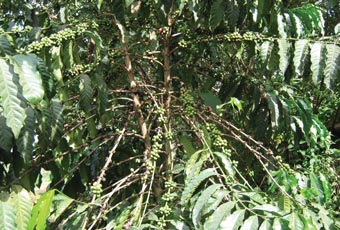
By Patrick Kagenda
Region was leading Arabica producer in Uganda before landslide
On March 2 several villages in Bududa district, which sits on the edge of Mount Elgon in eastern Uganda Bugisu region were buried under a landslide that killed approximately 350 people and destroyed, infrastructure, buildings, businesses, crops and animals.
Coffee growing, specifically of Arabica which is sometimes called Bugisu Arabica, appears to have been struck hard according to area politician and Chairman of the Bugisu Cooperative Union, MP Nandala Mafabi.
While by March reports were emerging that up to 250 acres of coffee gardens had been buried in the mudslide, Mafabi told The Independent in a July interview that the full extent of the devastation will only be felt in the future.
“That place was one of the fertile areas we have in Bududa,” he said, “The landslides did not destroy the coffee crops alone but even the people who were involved in coffee production died.
“In general the welfare of the Bagisu will go down by the equivalent of the 40 metric tons that was being produced from that area,” he says.
The Uganda Coffee Development Authority (UCDA) Eastern Regional Manager, Mike Butseya Maliro, says Bududa as a district had been harvesting about 20,000 metric tons of parchment.
When the landslides swept through the area in March this year 60,000 trees of coffee were destroyed which meant a destruction of about 40.8 metric tons of freshly picked coffeefor this year alone in the two harvesting seasons.
The smallholder producers in Bududa district are the leading producers of Arabica coffee in Uganda and the blow they suffered could impact the national and global Arabica coffee output.
Uganda is among the 10 top coffee producing countries in the world, accounting for 2.6 percent of global output according to 2008 International Coffee Organisation figures. Africa produces 10 percent of global output. In 2008/9 year, Uganda produced 198,000 metric tons of coffee, according to the East African Fine Coffees Association.

The UCDA is predicting a 10 percent decline in output for the 2009/10 coffee year which ends in September.
Mafabi says the government has shown no interest in restoring coffee production in the area. As a result, BCU has started its own coffee revival effort.
So far, he says, up to 100,000 seedlings have been secured for distribution in the Bugisu region.
He says: “In respect to the total amount we are injecting into the re-planting project we have Shs 0.5 billion in total and we have Shs 200 million for education purposes on coffee production, we have also set aside Shs 100million for disaster preparedness and for other issues including infrastructure we have committed Shs 100million.”
Mafabi’s target is not merely to revive the ravaged coffee plantations but expand productivity to the peak levels of the 1970s.
UCDA’s Maliro wants more long term investment to ensure sustainable coffee production.
“When about 500 homesteads abandoned their homes and took refuge into camps, the coffee trees remained not attended to which has a negative effect on their yield,” he says.
But the reaction from the locals to the coffee revival has exposed fresh challenges.
Mafabi says BCU has been providing facilities to the survivors of the landslide, including land so that they can cultivate but some have rejected the land which is in an area that does not grow good coffee.
Undeterred, Mafabi and BCU are pushing ahead to acquire a US$ 5 million plant to produce instant coffee.
“By the end of this year we should have signed a memorandum of understanding and see where we can borrow the money and the machinery and start the process,” he says.
 The Independent Uganda: You get the Truth we Pay the Price
The Independent Uganda: You get the Truth we Pay the Price


